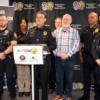By BOTWC Staff
From – https://www.becauseofthemwecan.com/
Reprinted – by Texas Metro News

As we round out Autism Awareness month, we’re taking a moment to highlight a segment of the autism population that often goes unnoticed.
Autism spectrum disorder (ASD) is often portrayed in a narrow way, with a focus on young white boys. This limited view overlooks the experiences of Black girls and women on the spectrum, leaving them feeling unseen and misunderstood. As active members of our respective villages, we strive to be equipped with the knowledge needed to provide community. Here are five things you should know about ASD in Black women and girls.
Presentation Can Differ
According to Open Doors Therapy, Black women and girls with autism often present differently. Classic symptoms of autism are often associated with boys, such as difficulty with social interaction and repetitive behaviors. Women and girls may exhibit social masking behaviors, where they mimic social cues to fit in, hiding their true selves. This masking can lead to feelings of isolation and exhaustion.
Underdiagnosis is a Problem
Stereotypes and a lack of culturally competent diagnostic tools contribute to underdiagnosis in Black girls. According to this scholarly journal, “although the prevalence of autism has been rising in recent years, disparities in diagnosis still remain. Female and Black populations in the United States are diagnosed later, are more likely to have an intellectual disability, and are excluded from research as well as services designed for autistic individuals.” As a case in point, Maria Davis-Pierre, CEO of Autism in Black, was not diagnosed until she was 37 years old.
Intersectionality Matters
Black girls with autism navigate a world with racial bias on top of social and communication hurdles. They may face additional challenges at school and have difficulty accessing support systems. In a 2021 article, Autistic Abolitionist Asiatu Lawoyin shared “Being AFAB (assigned female at birth), Black, and autistic means that since inception, because of the genetic components of my intersectional identities, mixed with transgenerational trauma, within societal systemic oppression, I have always been erased.”
Diagnosis Across Ages
Early diagnosis is possible. While the presentation may differ, Black girls with autism may still show early signs like delayed speech, repetitive movements, or intense focus on specific topics. If you notice these signs, talk to a pediatrician or mental health professional with experience diagnosing autism in Black children. Resources such as your state’s child development program (known as the Infants and Toddlers and/or Early Intervention program in many states) can help parents obtain free testing and therapy.
Benjamin E. Yerys, Ph.D., a psychologist in the Department of Child and Adolescent Psychiatry and Behavioral Sciences at The Children’s Hospital of Philadelphia, suggests “the first step toward seeking an adult autism diagnosis is to find an expert – a psychologist or a psychiatrist – who specializes in diagnosing ASD. Consider focusing first on finding adult psychologists as they, contrary to adult psychiatrists, receive more clinical training and exposure to conditions with early childhood onsets. To merit an ASD diagnosis, the patient must have experienced symptoms during their development.”
However, with the challenges surrounding mental healthcare for adults—Black and otherwise—self-diagnosis has also become an accepted form of diagnosis.
Community is Everything
Building a supportive community for Black girls and women with ASD is important. We can all be advocates by actively listening to their experiences, challenging stereotypes about autism, and promoting culturally competent resources. Start by educating yourself about how autism can manifest differently in girls and Black individuals. Understand that people with low support needs (formerly referred to as “high functioning”) are still autistic. Their intelligence does not erase their autism. Seek out and amplify the voices of Black autistic women. Finally, update your language. Avoid using outdated and ableist terms like “suffering from autism” and instead focus on strengths and lived experiences.
Cover photo: 5 Things You Should Know About Autism in Black Women and Girls / Models not subject of the article / Credit: Clarke Sanders









You must be logged in to post a comment Login